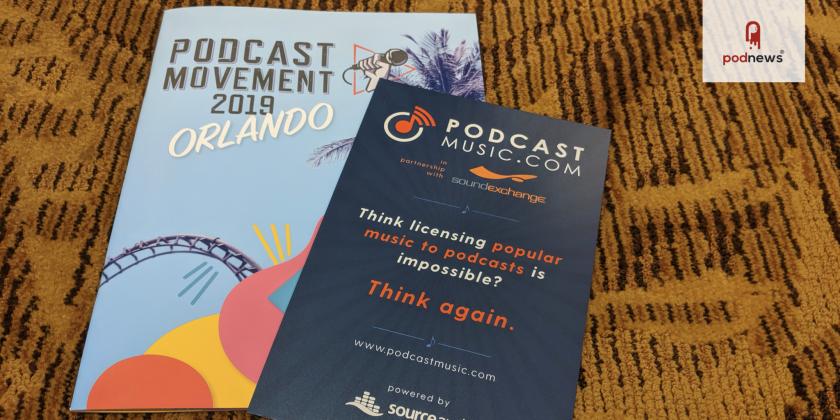
Details on the Podcast Music deal: a good day for podcasting?

This article is at least a year old
“Think licensing popular music to podcasts is impossible? Think again.” - the claim from Podcast Music in an insert in the Podcast Movement conference bag.
Listening to an interview with Douglas Reed, CEO of Podcast Music, on The New Media Show, reading their press release and having a chat with Douglas and others on their Podcast Movement stand, here’s what we know about this “monumental” deal that may allow podcasters to use well-known music in their podcasts.
It’s an agreement between SoundExchange, the US-based collection agency, and Podcast Music, a start-up company that will handle the billing relationship and catalog availability for podcasters, and legal agreements with labels.
Podcast Music has:
- no agreements with any record labels yet
- no technical interface yet with SoundExchange for billing or catalogue
- no music reporting solution yet with podcast hosts
These will be global licences, but they will only be available for purchase by US podcasters. “Global licences” in this case means anywhere that SoundExchange has a reciprocal agreement, which includes most large countries, but not Switzerland, Norway, Malaysia, to name just some. It’s a bit unclear what happens in these territories.
It’s up to the labels as to what music will be available, though Podcast Music is clear to point out that it is unlikely that anyone will get the rights to play whole tracks — this isn’t a way to play DJ. Labels could opt to license a track in a podcast for a limited time, after which you’d need to remove it. Some labels could only give licences to larger podcasts, or to podcasts on specific hosts. Some tracks may not be allowed as a “theme tune” for specific subjects, like political shows, but might be fine for less controversial areas. It’ll be “clearer in the next year”. Again — no labels have signed up to this yet, and Podcast Music are waiting to learn what conditions they’ll require.
There will be a tiered pricing structure based on how many downloads your podcast gets. Licences would be per episode, not per show. There’s no indication of price point, but it will be up to the labels, and in some cases, individual artists.
The goal is to have this up and running by April 2020; but they are planning to make some Christmas music available by the end of September as a trial. Podcast Music also offers re-sings, cover versions, and library music as well as well-known recordings — so they’ve already got material to licence.
Sound Exchange is just one of the collection agencies — they represent the record companies and the recordings. ASCAP/SESAC/BMI are collection agencies that represent the music writers and performers. While ordinarily both licences are required for use in podcasts, Podcast Music plan to licence the ASCAP/SESAC/BMI portion directly.
And a warning: the availability of a music licence for podcasts — in the US, at least — does mean that podcasts are likely to be automatically monitored for music use (as already happens on YouTube), and any unauthorised use will be flagged. It’ll be much easier to press for damages if a podcaster could have bought a licence.
In short, Podcast Music appears to have gained agreement with Sound Exchange to organise the “plumbing” that will eventually allow music licensing for podcasts. This is a vital service, and will significantly smooth the way for all parties. It is, truly, a momentous announcement, and is a great step forward.
Particularly, Podcast Music is focusing on releasing the revenue from the long tail. Podcast Music understand that there’s real benefit from unlocking revenue from the many thousands of smaller podcasters, rather than only working on a solution that works for Joe Rogan and Ben Shapiro. Podcast Music appears to have a good knowledge of the podcasting space, and sound as if they’re doing a good job helping the music industry to benefit. There’s been a lot of work so far, and it’s vital.
However, it’s too early to celebrate. Even with the plumbing in place, we currently have no idea whether we might have a shower or a bath and no understanding of how much it’ll cost; and crucially, nobody’s supplying any water yet either.
- If you’re interested in this sort of thing, you should subscribe to Podnews - free - and learn how this work progresses.
- For now, here’s how to use commercial music in podcasts.

































































































